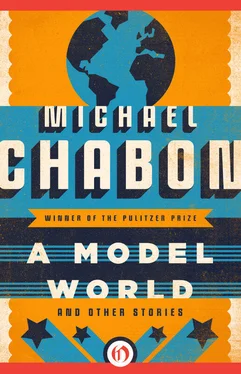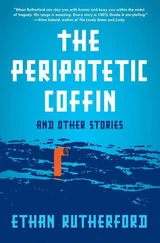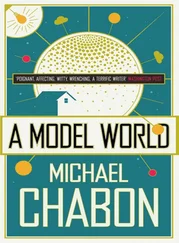Michael Chabon - A Model World And Other Stories
Здесь есть возможность читать онлайн «Michael Chabon - A Model World And Other Stories» — ознакомительный отрывок электронной книги совершенно бесплатно, а после прочтения отрывка купить полную версию. В некоторых случаях можно слушать аудио, скачать через торрент в формате fb2 и присутствует краткое содержание. Год выпуска: 2011, Издательство: Open Road Media, Жанр: Современная проза, на английском языке. Описание произведения, (предисловие) а так же отзывы посетителей доступны на портале библиотеки ЛибКат.
- Название:A Model World And Other Stories
- Автор:
- Издательство:Open Road Media
- Жанр:
- Год:2011
- ISBN:нет данных
- Рейтинг книги:5 / 5. Голосов: 1
-
Избранное:Добавить в избранное
- Отзывы:
-
Ваша оценка:
- 100
- 1
- 2
- 3
- 4
- 5
A Model World And Other Stories: краткое содержание, описание и аннотация
Предлагаем к чтению аннотацию, описание, краткое содержание или предисловие (зависит от того, что написал сам автор книги «A Model World And Other Stories»). Если вы не нашли необходимую информацию о книге — напишите в комментариях, мы постараемся отыскать её.
A Model World And Other Stories — читать онлайн ознакомительный отрывок
Ниже представлен текст книги, разбитый по страницам. Система сохранения места последней прочитанной страницы, позволяет с удобством читать онлайн бесплатно книгу «A Model World And Other Stories», без необходимости каждый раз заново искать на чём Вы остановились. Поставьте закладку, и сможете в любой момент перейти на страницу, на которой закончили чтение.
Интервал:
Закладка:
“What are you having, Nathan?” said his father.
“How much can it cost?” he asked, since the only things that sounded good were expensive. Nathan preferred, as a rule, to order the dishes with the most ingredients and with the most adjectives applied to them. His father tossed his head and waved away Nathan’s question.
“You can have whatever you want,” he said. It was what he always said, and it was one of the four thousand things for which Nathan adored him.
The waiter came and did his waiter’s tricks for Ricky, snapping out a napkin, mixing Ricky’s chocolate milk right at the table, pouring milk into the glass at first from just above it, then from a great height, then dipping and rising again, as though the milk were a white rubber band. Dr. Shapiro ordered soft-shell crabs, then rose from the table and went to find a pay telephone.
This was another recent and disturbing phenomenon. Nathan knew that his father liked to listen to the boys’ orders, to express his ceremonial approval or surprise. But in the past couple of months Dr. Shapiro had begun to disappear suddenly — to go off looking for pay phones in restaurants and department stores, preoccupied by “keeping in touch” with his patients’ parents, with the hospital, with his Pakistani colleagues. He telephoned so regularly and resignedly that Nathan came to associate these dutiful calls with the twice-weekly ones the boys got from him, which Ricky seemed to enjoy but which Nathan (and, he suspected, his father) found both difficult and somehow unjust.
Anne and Nathan looked at each other and shared a sarcastic smile, as though Dr. Shapiro’s new telephone mania were only ridiculous. Then the sarcasm went out of Anne’s face. She looked after her boyfriend with a furrowed brow, then turned to Nathan and tried to smile again. It was as though, for a moment, she had laid down her mask and told him that it was O.K. to worry, that, indeed, something abnormal was happening around them. In that moment Nathan felt that he loved her. But then she smiled.
Ricky, ordering the fried jumbo shrimps (he was in the throes of a mad shrimp phase), knocked over the entire glass of chocolate milk. His apologies were so irritable and sincere that a few of the shining admirals across the room looked over and laughed, grandly; the glass, after all, had not broken. Ricky smiled and calmed down. When their father came back, pulling at his beard, Ricky leaned toward him.
“Dad, the admirals laughed at me,” he said. “All the way from across the room.”
Anne took Nathan’s hand and whispered into his ear.
“It wasn’t Eric Clapton,” she told him, blushing.
“Oh,” said Nathan, watching his father look out emptily and awestruck over the platinum water, as though a great, gay ocean liner were passing by.
“It was the Rolling Stones,” she said. “It was ‘We Love You.’”
As they left the restaurant, it began to sprinkle again, and they hurried through the streets from shop to shop. One, full of old tables and chairs, stood beside another that was full of artistic toys — painted clowns, dancers on cords, wooden trains in the shapes of ducks and ducklings. So they split up. Lately Dr. Shapiro and Anne had become interested in old furniture, and although Nathan had tried for a little while to share their interest, as an adult would — to examine the splinters of wear in a wicker seat, to see how tables could be important — it was not easy to do, so when Ricky failed to spot the toyshop immediately, Nathan pointed it out to him. He waited for Ricky’s shouts of discovery, then feigned acquiescence when his father ordered him to escort his brother into the shop.
They quickly discovered that most of the artistic toys were in the windows, and that it was really just an ordinary toy store, with fine, ordinary toys. Ricky was overjoyed. He shot at Nathan with a ray gun that threw sparks and whined, put on a small diving mask and hooted through the snorkel, got all the battery-powered toys to crawl and beep across the table on which they were displayed, exclaiming happily when they crashed into each other. Whenever Nathan went into toy stores these days, a confusion of feelings came over him, and now he stood, hands in pockets, beside a glass case of miniature knights, soldiers, and farm animals, absently watching his brother cause toy disaster.
At home, with their mother, Ricky did little harm to fixtures or vases, but his mood was black, and he kicked and shrieked; with their father he was festive and wily, and full of comments, but he couldn’t be trusted near anything valuable, and sometimes the sturdiest appliances came to pieces under his hand. Their mother’s nerves were shattered, like their father’s pipes and tumblers. When Ricky was not around, he was discussed in a manner that made Nathan uneasy, because the assumption seemed to be that Ricky had some kind of problem, or would soon be a problem — which, when Nathan thought about it for a minute, almost certainly meant that he, too, was a problem, only older.
“Nate! Nate!” said Ricky, from somewhere at the front of the toy store. Nathan looked one last time at the toy horse and crusader, reared up on their swath of metal turf — the only thing in the store that he even faintly coveted — then went to find his brother. Ricky stood on tiptoe, clutching the top of the low wood partition that protected the display of untouchable toys in the front window; he was looking past all the duckies and dancers to something in the street outside.
First Nathan saw the fabulous car, It was like a color-plate in the cumbersome book he’d been given for his eleventh birthday, The History of the Motor Car —a Cord, or a Duesenberg, or a Daimler, or one of those other extinct breeds of car that looked like small, wheeled mansions, with curtains, doorknobs, tiny lamps, the running boards like long verandas. And, as in the illustrations Nathan had gazed at, on the toilet or under the covers of his bed for hours at a time, there was something airless and artificial about the car — something as dead and impossible as the reconstructed skeletons of Allosaurus and Triceratops in a museum. There was a story, famous in their family — even Anne knew it — about Nathan at age four asking his parents which had come first, the dinosaurs or the old-fashioned cars. It still sometimes seemed to him that the things that had happened before he was born — Pearl Harbor, hieroglyphics, catapults, the day his parents fell in love — were equally ancient and interesting, cryptic and gone.
“It’s a millionaire,” said Ricky.
“It’s a playboy,” said Nathan.
The man stood in the light rain with one foot on the running board of his car, staring off toward the distant bay. He wore a blue blazer with a coat of arms on the breast pocket, white trousers, no socks, blue sailor’s sneakers. In one hand he casually held a briar, and in the other a gold lighter. He neither slouched nor stood erect, and Nathan immediately adjusted his own posture to match the playboy’s, but it was the man’s short silver hair that Nathan admired most, and the perfect wrinkles at the corners of his eyes, and his slight smile.
“See that silver hair?” said Nathan. “When I’m old I want to have hair like that.”
“It’s gray,” said Ricky. “Can that car go a hundred miles an hour?”
“Any car can go a hundred miles an hour,” said Nathan the older brother. “You’re just supposed to look at that car. It doesn’t go anywhere.”
Their father appeared on the sidewalk in front of the toy store, and he and the playboy said hello.
“Dad’s talking to him,” said Ricky.
“You’re allowed to talk to guys like that when they stand there with their cars,” said Nathan. “They like it.”
Читать дальшеИнтервал:
Закладка:
Похожие книги на «A Model World And Other Stories»
Представляем Вашему вниманию похожие книги на «A Model World And Other Stories» списком для выбора. Мы отобрали схожую по названию и смыслу литературу в надежде предоставить читателям больше вариантов отыскать новые, интересные, ещё непрочитанные произведения.
Обсуждение, отзывы о книге «A Model World And Other Stories» и просто собственные мнения читателей. Оставьте ваши комментарии, напишите, что Вы думаете о произведении, его смысле или главных героях. Укажите что конкретно понравилось, а что нет, и почему Вы так считаете.












